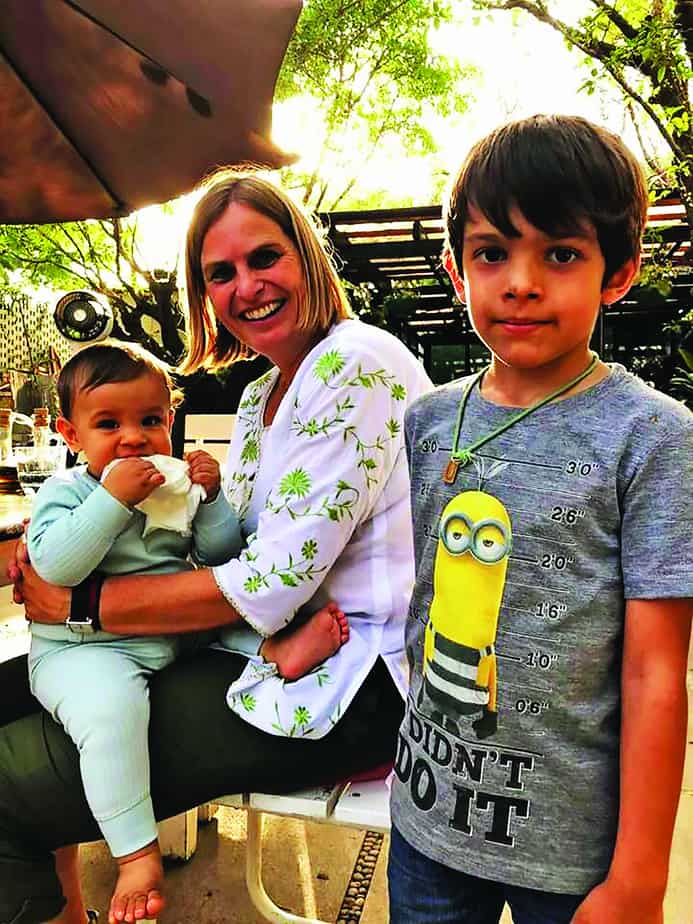
Britta Petersen was a Nirvana seeker from an early age. She has tried many things in her quest for enlightenment. In the process, she never lost the track of life. She is creative, assimilative and blessed with entrepreneurial acumen.
Now in her early 50s, she grew up in an middle-class family in Germany where religion was not the order of the day. She practised Christianity for a bit, soon she realised it didn’t quell her inner yearnings. When she was 15, she was introduced to Buddhism through a book called The Way of the White Clouds by Lama Anagarika Govinda. The book was about a German Buddhist monk who met his master in Sri Lanka and lived for a long time in Almora district of Uttarakhand. It had a profound impact on her and began her quest with the eastern way of life. She was barely 20 years, already pursuing Buddhism ‘systematically’ but realised she’s ‘stuck’ and that she’s looking for ‘something beyond.’
Her contact with India started around the same time, in the late 1980s, when she was in the subcontinent for six weeks. Five years later, after finishing her masters, she backpacked for a year all over the world, of which three months were spent in India. Her experience was not very different from that of Mark Zuckerberg and Steve Jobs, whose tryst with mysticism in India shaped them. Of course, they went back and created institutions that changed the world, and became some of the wealthiest persons on the planet. Whereas Britta got the necessary inspiration backpacking in India, facing the heat and dust and living in the mystical land. India fascinated her no end.
The real association, however, started with the subcontinent about eight years later, on a tragic note. By now a journalist with German Financial Times, she was send to Kabul post 9/11. Suddenly the focus of the whole world was on Afghanistan in particular and the Indian subcontinent in general. Those were tricky times, but the situation in Afghanistan was much better than it is now, she explains. Britta, along with her business partner, who was from an Afghan family, founded a journalism school for the locals and opened a restaurant in Kabul by the name Sufi.
Britta’s partner’s family, since the Russian occupation of Afghanistan, had moved out to Europe. Nearly two decades later, they found the family cook in Kabul. The old gentleman helped them set up the restaurant that served authentic cuisine of the land. This was also the time she learned Persian and was enchanted by Sufi poetry. Sufism is not in line with the Taliban’s ‘narrow interpretation of Islam’ therefore underwent a lot of repression.
After a stint in Pakistan for four years, where she headed the German Green Party foundation — The Heinrich Böll Stiftung / Foundation, she came to Delhi in 2014 and joined Observer Research Group as a senior fellow, with the collaboration of GIZ, the German aid agency.
Much before she started living in Delhi, during her journalistic days (in 2007), she interviewed Jaggi Vasudev, popularly known as the Sadhguru. At that time, remembers Britta, he was ‘not a big thing’. She describes her interaction with him as profound. Though this was an official engagement as a journalist, he “blew me through the roof,” she recollects. By the end of the conversation, Britta was convinced this man is her guru. “I have met many teachers in my life. But I knew he was the Guru I was looking for.” And she was initiated to ‘Shivaite’ tradition.
There was a phase in the 1960s and 70s when hippies were drawn to Eastern philosophy and Hinduism. Like poet Allen Ginsberg had famously written, ‘Follow your inner moonlight; don’t hide the madness.‘ But, since then, alternative worldviews had fairly integrated with the mainstream. As the philosophy of the East gained much wider appeal, even people from business communities were attracted to this alternative way of life. Britta was no exception, she pursued Buddhism, checked out Sufism, does Yoga, is fascinated with Bhakti tradition and Advaitha or non-dualism philosophy.
Britta attended many of the programmes carried out by Sadhguru in the subsequent years. And the outcome was welcome. “My association with Sadhguru did wonders for me,” she sums up. And when the opportunity to buy an abode came a few years ago in the Isha Foundation Ashram located at the foothills of the Velliangiri Mountains, near Coimbatore, she didn’t miss it.
Britta is the single parent of a six-year-old son, who is attending a German international school here in Delhi. But at a convenient time in the near future, she plans to shift to Isha Ashram and settle down there. Though, taking care of her ageing parents in Germany is also a concern.
So the moot question is: who are you? A Christian, or a Buddhist or a Sufi or a Hindu? She smiles and replies, “Ultimately, the objective is to slowly dissolve self.” She doesn’t feel the need to identify with a certain religion. “I learned all these paths–(there’s) no need to identify with any.” She remains a quintessential backpacker, where the journey is important than the destination.
The Jio Intelligence Pavillion at the AI Summit holds within its cove-like setup depcitions of…
Delhi hosted what organisers describe as the world’s first player auction in golf, launching ‘72…
An elderly woman recalls how her six-year-old granddaughter lay bleeding after a speeding car hit…
Municipal Corporation of Delhi plans a unified policy enabling RWAs to adopt and maintain parks…
A 17-year-old boy allegedly died by suicide after jumping before a moving train at Uttam…
Delhi High Court grants bail to 26-year-old Thar driver accused of mowing down two in…